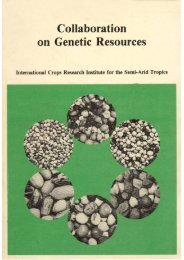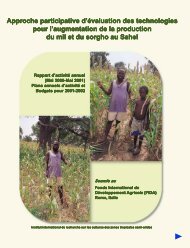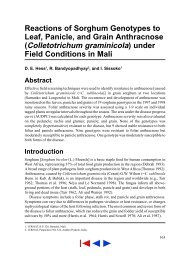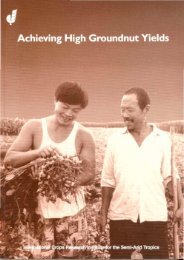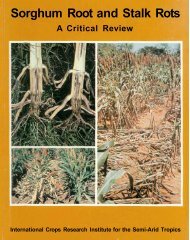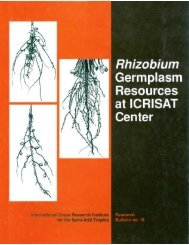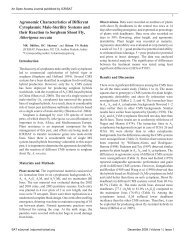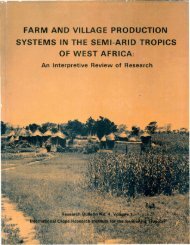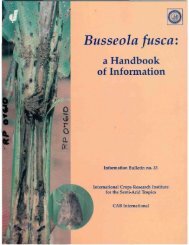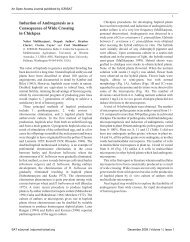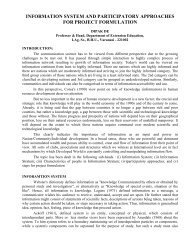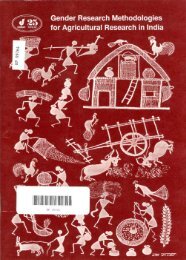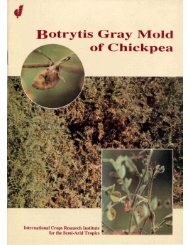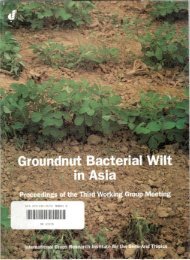RA 00183.pdf - OAR@ICRISAT
RA 00183.pdf - OAR@ICRISAT
RA 00183.pdf - OAR@ICRISAT
You also want an ePaper? Increase the reach of your titles
YUMPU automatically turns print PDFs into web optimized ePapers that Google loves.
Recent Progress and Future Strategies<br />
of the Groundnut Improvement Program<br />
at the ICRISAT Sahelian Center<br />
B.J. Ndunguru 1 , F. Waliyar 1 , D.C. Greenberg 1 , and P. Subrahmanyam 2<br />
Introduction<br />
The goal of the Groundnut Improvement Program at the ICRISAT Sahelian Center (ISC), is to<br />
develop high-yielding breeding lines adapted to various agroecological zones in West Africa.<br />
These lines are also endowed with resistance to the biotic and abiotic stress factors that limit<br />
production and are suitable for small farmers in the region. While stress factors vary from<br />
region to region, drought, foliar diseases, viruses (rosette and peanut clump), aflatoxin, crop<br />
growth variability, and unsuitable cropping systems are the most frequent problems affecting<br />
yield and stability of groundnuts in the region. Therefore, the ISC program concentrates on<br />
these problems.<br />
Progress<br />
We made considerable progress in some of the areas. We improved drought screening<br />
technology and initiated studies to identify genotypes and management strategies to decrease<br />
the adverse effects of high temperatures.<br />
We surveyed groundnut diseases in Niger, Burkina Faso, and Guinea, and estimated yield<br />
losses from foliar diseases in Niger. Multilocational trials for testing the stability of rust and<br />
late leaf spot resistance have been initiated. Yield losses due to diseases in Niger range<br />
between 19% and 38%.<br />
Peanut clump virus (PCV) has been identified as one of the causes of crop growth<br />
variability and was observed in farmers' fields in Burkina Faso and Niger. The virus has a<br />
wide host range and among crops tested, only sunflower did not show the PCV antigen.<br />
Crop growth variability can be effectively controlled by the soil application of pesticides or<br />
a combination of pesticides with farmyard manure. A syndrome of PCV and three species of<br />
nematodes (Scutellonema, Telotylenchus, and Xiphinema sp) was found to be associated<br />
with crop growth variability.<br />
Several lines from the A. flavus resistant germplasm at ICRISAT Center which have<br />
significantly outyielded 55-437 showed a high level of resistance. Lines from ICRISAT Center<br />
(ICGV 87107, ICGV 87107 and ICGV 87110) as well as some introduced lines such as J 11<br />
and AH 7227 showed good levels of A. flavus resistance.<br />
1. Principal Groundnut Agronomist and Team Leader; Principal Groundnut Pathologist; Former Principal Groundnut<br />
Breeder, ICRISAT Sahelian Center, B.P. 12404, Niamey, Niger (via Paris).<br />
2. Principal Groundnut Pathologist, SADCC/ICRISAT Groundnut Project, Chitedze, P.O. Box 1096 Lilongwe, Malawi.<br />
Citation: ICRISAT (International Crops Research Institute for the Semi-Arid Tropics). 1991. Summary Proceedings of<br />
the Second ICRISAT Regional Groundnut Meeting for West Africa, 11-14 Sep 1990, ICRISAT Sahelian Center,<br />
Niamey, Niger. Patancheru, A.P. 502 324, India: ICRISAT.<br />
54



